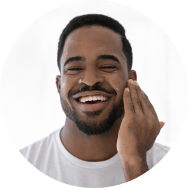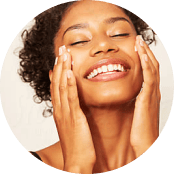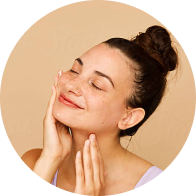
Did you know that your lifestyle choices can significantly affect your skin exposure levels and therefore influence your skin health and appearance?
Are you keen to learn how you can make positive changes to help protect and enhance your skin? If the answer’s ‘yes’, then read on to discover how you can give your skin the best chance of looking good and staying healthy.
Your Lifestyle: Your Skin
Have you noticed a correlation between your skin and your lifestyle? If not, think back.
Perhaps there was a time when you had a special event and you were desperate to look good, only to discover an angry red spot appear on your chin the night before.
Or maybe you can recall a time when your skin decided to up its itchiness levels… and now you think about it, it was actually a time of high stress. You might think these things are pure coincidence but they’re really not.
Our skin is a great indicator for what’s going on inside our bodies, and working on your exposure levels can really help to boost your skin health.
A healthy lifestyle can have a huge impact on your skin, so let’s take a look at what you can do to help alleviate skin concerns.

Sun Exposure
According to Melanoma Focus, the UK public frequently ignores the dangers of prolonged exposure to the sun’s UV rays. And they state that, “1 in 36 men and 1 in 47 women in the UK will be diagnosed with melanoma skin cancer in their lifetime.”
While skin cancer is a huge cause for concern when it comes to spending too much time in the sun without proper protection, the sun can also cause further problems for your skin (1). These include -
- Premature ageing
- Pigmentation
- Fine lines and wrinkles
- Skin texture
- Complexion irregularities
We’re not telling you to avoid the sun’s rays and stay indoors for the rest of your life, but if you want to make sure you give your skin a good chance of steering clear of cancer, and stay looking good, you need to make sure your skin is properly prepared. To do this, you can -
- Cover-up with protective clothing. Your best choices are fabrics with a dense weave that you can’t see through - opt for denim, cotton, and synthetic fabrics that will block the sun from reaching your skin
- Invest in decent sunscreen. We’re talking broad spectrum, water-resistant sunscreen with SPF50 protection. A sunscreen with these credentials will filter out 98% of the sun’s harmful UV rays
- Embrace the shade. If you spend a lot of time outdoors, make sure you have access to shelter. It could be a tree, parasol, or an awning. Whatever your options, make sure you can take cover when the sun’s out in force - your skin will thank you for it
- Give your skin a helping hand from within by consuming foods that are high in sun-shielding antioxidants. If you know you’ll be out in the sun, you can try eating things like almonds, sweet potatoes, grapes, tomatoes and salmon during the day to keep your skin protected from those harmful UV rays. Add lemon and oranges too and you’ll be dosed up on vitamin C - another powerful antioxidant
Environmental Factors
Pollution, climate, and urban living can all affect your skin health and exposure levels. If you live in an urban environment, your skin will be much more exposed to pollution than someone who lives in the countryside. This can have a negative effect on your skin (2) and could lead to -
- Damage to the skin barrier
- Dehydration
- Premature ageing
- Skin cancer
- Existing skin conditions like psoriasis, eczema, acne, and contact dermatitis getting worse
A change in climate can also wreak havoc on your skin. And, as anyone who’s been living in the UK for the past few years will know, our climate is currently experiencing some pretty extreme changes. From summers where 40-degree heatwaves are becoming more regular, to winters where we’ve endured prolonged spells of freezing temperatures… our skin is taking a hit. Climate can trigger skin flare-ups of conditions such as acne and eczema, and make hives and rashes more problematic too.
To give your skin its best chance of success, follow these tips -
- Avoid peak sun hours between 10am and 4pm
- Wear sunscreen every day
- Check the quality of the air. You can do that on the Defra website here
- UV radiation can deplete your body’s vitamin C and E levels so make sure you eat a vitamin-fuelled diet and especially when you’re spending time outdoors
- Keep hydrated by drinking plenty of water
- Up your vitamin levels with the help of topical vitamins and supplements
- Choose clothing that offers good coverage and protection from the sun
- As well as using sunscreen, consider using a vitamin C serum to protect from damage caused by free radicals and oxidative stress
Diet and Nutrition
Diet choices, hydration levels, and your nutrient intake all play a vital part in your skin’s health and its ability to combat exposure-related damage (3,4). It’s no secret that a diet high in fat, sugar, and alcohol isn’t good for your skin, and when you add smoking into the mix too you’ve got the perfect recipe for a skin disaster. But what foods can you look to, to boost your skin health?
If you suffer with dry skin, you can up your fluid intake by eating foods with a high water content. Fruits and vegetables are a great place to start. If you’re looking to beat the signs of ageing, meanwhile, look to the trusty banana. These fruits are packed full of vitamins A, B, and E, as well as magnesium, and antioxidants, all of which help to protect your skin from damage caused by free radicals. This, in turn, helps to combat the signs of ageing.
Want to up your collagen levels? There are loads of goodies you can eat to help supercharge your collagen. Chicken (with the skin on), sardines, berries and beef bone broth are all good sources of collagen, while nuts such as almonds and cashews will help your body to produce more collagen.
Sleep and Stress
If you struggle with maintaining a decent bedtime, would it help if you knew that there’s a correlation between your sleep patterns, stress levels, and their impact on skin health and exposure levels? Sleep doesn’t just make us feel better, it makes us look better too!
While we sleep our skin is able to rest and reset and switch into recovery mode. Skin regenerates during the day but it does so at a much slower pace, so get to bed early and give your skin a proper chance of upping its production of skin cells (5). For best results aim to get 7-9 hours of sleep on a regular basis.
But it’s not just sleep that helps our skin, it’s monitoring your stress levels too. Without enough sleep, cortisol (the stress hormone) is produced and if this happens regularly, you can expect -
- Increased sebum production
- The breakdown of elastin and collagen
- Increased blood flow to the skin - causing redness
Keep tabs on your stress levels and your skin will thank you for it.
Skincare Habits
Last on our list is all to do with your skincare habits. That’s because how you care for your skin - including your skincare routines, cosmetic use, and cleansing habits - all plays a big role in managing exposure levels too.
A proper skincare routine doesn’t just help skin look good, it helps protect it from damage caused by other factors such as the environment, sun exposure, and sleep and stress. And, as we’re constantly shedding skin cells, it’s vital to care for your skin properly if you want to steer clear of conditions such as acne and ageing.
The good news is that an effective skincare routine doesn’t have to be time consuming. It can be as simple as cleansing, moisturising, and applying SPF. In fact, that’s what you’ll do for your morning routine when you sign up for a personalised MiQuest subscription.
Then, in the evening you cleanse and moisturise once more and finish with your Q-Stick (where all your personalised active ingredients are stored). It’s as simple and straightforward as skincare routines come, but the difference is that it’s completely personal to you.
What’s more, because we use our AI scanning technology to assess your skin, we’re able to identify the ingredients your skin really needs and the ideal method of delivery to make sure your skin benefits fully from these ingredients.
It’s called our smart drug delivery system and it works in harmony with your skin to improve your skin health. Whether it’s rosacea, acne, pigmentation or ageing issues - a MiQuest subscription gets to work fast.
Skin Health: The Power is Yours
Now you’re all clued up on the best ways you can boost your skin health and help keep exposure levels low, we hope you’ll see a noticeable improvement in any skin concerns you’re experiencing.
If you’re looking to really sort out your skin, try a MiQuest subscription and watch your skin transform.
References:
- Gonzalez, S., Gilaberte, Y., Philips, N. and Juarranz, A., 2011. Current trends in photoprotection-A new generation of oral photoprotectors. The Open Dermatology Journal, 5(1).
- Parrado, C., Mercado-Saenz, S., Perez-Davo, A., Gilaberte, Y., Gonzalez, S. and Juarranz, A., 2019. Environmental stressors on skin aging. Mechanistic insights. Frontiers in pharmacology, 10, p.759.
- Parke, M.A., Perez-Sanchez, A., Zamil, D.H. and Katta, R., 2021. Diet and skin barrier: The role of dietary interventions on skin barrier function. Dermatology Practical & Conceptual, 11(1).
- Cao, C., Xiao, Z., Wu, Y. and Ge, C., 2020. Diet and skin aging—From the perspective of food nutrition. Nutrients, 12(3), p.870.
- Xerfan, E.M., Andersen, M.L., Facina, A.S., Tufik, S. and Tomimori, J., 2022. Sleep loss and the skin: Possible effects of this stressful state on cutaneous regeneration during nocturnal dermatological treatment and related pathways. Dermatologic Therapy, 35(2), p.e15226.






AI-Empowered Dermatology, Personalised For You.






